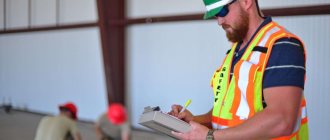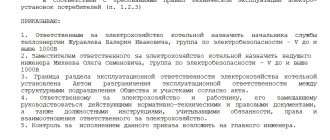Description and what technical support means
Technical support is a service that users of a product or service can contact for technical support to solve a problem, as well as for additional information on an issue of interest.
It is also worth noting that a technical support service can also be organized to serve company employees within the organization, for example, if employees need technical assistance with computer equipment (the computer/printer is broken) or non-working software.
Separately, we can highlight technical customer support (or customer support). This type of support has a strategic focus and is aimed at building long-term relationships with clients.
GENERAL PROVISIONS
1.1. This job description defines the duties, rights and responsibilities of the technical support engineer of the Limited Liability Company “Umelets” (hereinafter referred to as the Company).
1.2. A technical support engineer is classified as a specialist and is appointed to a position to provide technical support to customers to ensure the uninterrupted operation of equipment and software products.
1.3. The decision on the appointment of a technical support engineer and on dismissal from the position is made by the General Director on the recommendation of the head of the technical department on the basis of acts of labor legislation in the Russian Federation. The appointment and dismissal of a technical support engineer is carried out by order of the General Director of the Company.
1.4. The technical support engineer reports directly to the head of the technical department.
1.5. During the absence of a technical support engineer (vacation, illness, etc.), his duties are performed by a person appointed in the prescribed manner, who acquires the corresponding rights and is responsible for the performance of the duties assigned to him.
1.6. In his activities, a technical support engineer is guided by: the legislation of the Russian Federation, orders and instructions of the General Director of the Company, the Company's charter, internal labor regulations, this job description, as well as other internal regulations. Such as current regulatory and technical documents, local regulatory acts, regulatory and administrative documents issued by the head of the Company.
1.7. A person with a higher technical education and experience of successful work in a similar position for at least 2 (two) years is appointed to the position of technical support engineer.
1.8. A technical support engineer must know:
– resolutions, instructions, orders, methodological and regulatory materials on equipment operation issues;
– technical and operational characteristics, design features, purpose and operating modes of equipment, rules for its technical operation and testing;
- programming languages;
– organization of testing;
– fundamentals of mathematical software and programming;
– methods for developing work schedules and reporting;
– basic standards (domestic and international) for equipment;
– basics of information security;
– telecommunication technologies, products from leading manufacturers;
– telecommunications structure;
– technical English (fluent reading and translation of specialized literature);
– rules and regulations of labor protection, safety and fire protection; – other local regulations.
1.9. To perform the functions and exercise the rights provided for in this job description, the technical support engineer interacts:
– with the General Director of the Company or his deputy on issues of receiving instructions, instructions, orders related directly to his activities;
– with the head of the technical department on the implementation of technical support for production at their site of work;
– with employees included in the technical department regarding the performance of their job duties;
– with other employees on the following issues: obtaining all necessary, properly executed documents for carrying out operations to manage your project.
How easy is it to master the profession?
Often, at the initial stage (first line of support), employers do not require deep technical knowledge. The main thing is the ability to work with a PC, with technical documentation and specialized software. Therefore, very often, students and aspiring IT specialists begin their career path by working as a technical service specialist. Recently, more and more companies are demanding a good level of English.
To start working as a second-level technical support specialist, you need a supply of technical knowledge (for example, often in job descriptions you can find a requirement for at least a year of experience as a Linux or Windows system administrator).
Pros and cons of working as a technical support specialist
pros
- an excellent start for beginning IT specialists without much technical knowledge
- rapid career growth
- demand for the profession
- teamwork
- communication with different people
- work in the IT field
- participation in improving the company's service or product
- from the start you receive a high salary (relative to non-IT specialties)
Minuses
- Stressful and routine work
- Patterns of communication with clients
- The need to always be patient and polite when dealing with clients
- Some of the lowest salaries among technical IT specialties
- Often the requirement for knowledge of English is much higher than for other specialties due to the fact that technical support is the face of the company
III. Rights
The technical expert has the right:
1. Request and receive the necessary information, as well as materials and documents related to issues of their activities.
2. Improve your qualifications, undergo retraining (retraining)
3. Take part in the discussion of issues included in his functional responsibilities.
4. Make suggestions and comments on how to improve activities in the assigned area of work.
5. Require the management of the organization to provide assistance, including ensuring organizational and technical conditions and execution of the established documents necessary for the performance of official duties.
6. Make independent decisions, guided by qualification requirements and job responsibilities
7.___________________________________________________________
Responsibilities and tasks of technical support
- Registration of user requests in the HelpDesk system
- redirecting user requests/requests to the appropriate technical support specialists to resolve the problem (this mainly applies to the first line of technical support)
- keeping a log describing the actions performed and decisions made, followed by entering the decisions into a single database
- providing assistance and advice during installation, configuration and updating of the software product, as well as on using the service
- providing assistance in solving technical problems when using the product/service and its further coordination
- providing assistance in restoring the functionality of a software product after fatal failures
- provision of technical information on the functionality of the product/service
- analysis of problems and development of recommendations for eliminating them that were identified when using the product/service
- respond to user requests in a timely manner
- knowledge of the procedure and rules for processing user requests
- knowledge of standard solutions and answers to the most frequently asked questions from users
- knowledge of product specifications
dtpstory.ru
4.4 Require performers to finalize documents prepared in violation of the established rules for their preparation and execution (GOST 6.38-90).
4.5 Submit proposals for management’s consideration to improve the documentation support of the enterprise’s activities, improve the forms and methods of management work based on the use of electronic technology.
4.6 Creating normal conditions for the performance of official duties and the safety of all documents generated in the activities of the enterprise. 4.7 Make decisions within your competence. 4.8 Use the benefits established by the legislation of the Russian Federation and provided for employees in the collective agreement of the enterprise.
The Document Management Specialist may replace the Leading Document Management Specialist of the Administrative Department during his absence.
Other
Skills and requirements for a technical support specialist
- Confident knowledge of Windows and Linux operating systems (including server versions)
- Confident knowledge of PCs and office programs (possibility of minor repairs and problems, ability to work with anti-virus programs to remove viruses and eliminate their consequences
- basic understanding of local network organization, operation and settings of network equipment such as Wi-Fi router and USB modems
- ability to work with software for receiving, processing and registering applications and user requests (often trained directly within the company after hiring)
- understanding of the principles of working with user requests: systematization, determining the level of importance and priority of the request;
- ability to work and understand technical documentation
- friendly communication and ability to express oneself clearly
- knowledge of English
- technical thinking
- ability to find solutions to problems independently
Career growth of a technical support specialist
As in almost all IT specialties, the gradation of Technical support is as follows:
– junior (first line of technical support or technical support level 1)
– middle (second line of technical support or technical support level 2)
– senior (third line of technical support or technical support level 3)
The main difference between the gradations of career growth of technical support specialists is the complexity of solving problems.
As a rule, the first level is the level for young and beginning professionals, whose responsibilities include solving very simple problems, drawing up tickets, answering the phone to clients;
Level 2 – at this level there are more experienced specialists who are able to solve less complex problems;
Level 3 – specialists with the highest category of qualifications work here. Their responsibilities include solving problems that the 2nd level of technical support could not cope with.
What should be included in an engineer's job description?
4.4. For violation of information confidentiality regimes, failure to ensure systematization and safety of documents to which he receives access in the course of carrying out his job duties, in the manner and under the conditions established by the legislation of the Russian Federation.
Today, the engineering profession is one of the most in demand in the labor market. The functional responsibilities of this employee depend not only on his specialization, but also on the place of work, therefore, in each individual case, the job description of an engineer is drawn up on an individual basis.
Today we will talk about how to correctly draw up this document and what provisions need to be included in it.
The first section of the engineer's job description states:
- what category does the employee belong to;
- what education and work experience should he have;
- in what order a person is appointed to a position and removed from it;
- to whom does the specialist report?
- to whom the employee’s job responsibilities are transferred during his absence from the workplace.
An engineer is a specialist with a higher professional education, whose category depends on the employee’s work experience.
Thus, an applicant for the position of category 1 engineer must have at least three years of experience as a category 2 engineer.
To work as a category 2 specialist, you must have at least three years of experience as a category 3 engineer.
To get a position as a category 3 engineer, you must have at least three years of experience as an engineer.
At the same time, there are no work experience requirements for candidates for the position of engineer.
During the engineer’s absence from the workplace, his duties and responsibilities are transferred to another employee appointed by the director of the enterprise in the prescribed manner.
An engineer must be guided in his activities by:
- Charter of the enterprise;
- own job description;
- labor regulations;
- regulatory documentation on the work performed;
- methodological materials related to relevant issues;
- instructions and orders of the immediate manager/director of the enterprise.
To work successfully, an engineer needs knowledge of:
- principles of operation, technical characteristics, design features of developed and used technical means, materials and their properties;
- modern means of computer technology, communications and communications;
- research methods, conditions and rules for performing work;
- basic requirements for technical documentation, products and materials;
- current standards, technical specifications, instructions and regulations for the preparation and execution of technical documentation;
- administrative and directive documents, normative and methodological materials on issues of professional activity;
- prospects for technical development and features of the activities of enterprise divisions;
- methods for carrying out technical calculations and determining the economic efficiency of developments and research;
- fundamentals of labor organization, management and economics;
- basics of labor legislation;
- norms and rules of labor protection;
- achievements of science and technology, as well as advanced foreign and domestic experience in the relevant field of activity.
As mentioned above, the labor functions of an engineer depend, first of all, on their specialization and place of work. However, the following job responsibilities are standard for all specialists:
- providing practical and methodological assistance on issues within his professional competence;
- carrying out work in the field of scientific and technical activities in construction, design, information services, labor organization, production and management;
- monitoring compliance with current regulations, established requirements, standards and rules;
- carrying out examination of technical documentation;
- participation in the research work of the organization with the subsequent implementation of the results into production.
In addition to the duties, any engineer also has rights, including:
- appealing to the management of the organization with demands for assistance in the performance of one’s own official duties and rights, as well as proposals for improving one’s work;
- familiarization with draft decisions of the head of the enterprise relating to his work activities;
- obtaining from managers and specialists of structural units information and documents necessary to perform labor functions;
- involvement of specialists from the organization’s structural divisions to resolve operational issues within the competence of the engineer (if this is provided for by the relevant regulations on structural divisions, otherwise - only with the permission of the director of the enterprise).
The employee's area of responsibility should be specified as a separate section.
Main
You can find an example of a standard instruction for a chief engineer here: https://yadi.sk/i/oxA0VHD73UUwnZ
Sample job description for a specialist in the production and technical department: https://yadi.sk/i/kXrZD13UUxMB
Presenter
The labor functions of a leading specialist look like this: https://yadi.sk/i/wKqwPV-w3UUxXv
Civil engineer
Civil engineers work according to the following type of instructions: https://yadi.sk/i/RfZh0SCI3UUxhW
Technological engineer
Job description form for this employee: https://yadi.sk/i/LINnx7673UUxoJ
We have posted a document suitable for a software engineer here: https://yadi.sk/d/XfA01qr13UUxxd
At the following link you will find the job description of an instrumentation and automation engineer: https://yadi.sk/i/NG8nN5om3UUyGq
Electrical engineer
Types of technical support
Technical support can be divided into 3 areas:
- infrastructure support;
- user support;
- product support.
Technical support services can be provided either free or for a fee. Paid technical support is provided for a certain period of time at a certain price and may include the following services:
- 24/7 monitoring
- 24/7 technical support
- Technical assistance with on-site specialist i.e. on-site assistance
- Backup, disaster recovery
The most common ways to access technical support are via chat, email, contact form, phone, control panel, and usually on weekdays.
In the event of a user request, technical support specialists are required to find out the nuances of the problem, find and suggest ways to solve this problem, and also give recommendations for further prevention of such a problem.
Processing of requests from users and clients occurs using software, for example, Helpdesk and Salesforce.
Section "Goals"
Depending on what functionality is expected to be entrusted to a particular specialist, a number of fundamental areas for IT specialists can be identified, each of which requires specific knowledge and skills:
- Help Desk: A specialist is usually available 24/7 to provide advice and assistance to anyone using a computer in the organization. He receives phone calls for help and responds to problems. Most of the time, an IT specialist can solve problems remotely; in particularly complex cases, they can travel to the site.
- Network Administration: An IT professional is responsible for maintaining the day-to-day operations of a computer network. Its job is to make sure that network systems can communicate.
- Security: An IT specialist is involved in developing software to prevent cyber attacks. An information security specialist develops software, such as data encryption programs and firewalls, to protect an organization's computer systems and networks.
- Database Analysis: An IT professional uses specialized software to organize, manage, and store data (financial information, shipping documents, purchase orders, payroll records, or administrative expenses). The DBA provides this information to users in the organization and sets up security procedures to prevent unauthorized access.
- Cloud computing: moving data storage to the cloud. An IT professional is the architect of the cloud infrastructure that meets an organization's unique requirements.
- Software Development: This specialist works with other IT departments to create programs that perform specific tasks.
- Software Engineer: Tests and installs systems on computers.
- Analyst, Business Analyst: A technical specialist takes data that a company stores on its computer or in the cloud and converts it into charts and tables.
Technical support issues
Despite all the main advantages of working with technical support specialists, there are a number of specific problems. The most common problems include:
- “Narrow focus” of specialists - often technical support specialists are well versed in their product, but are very limited in other areas of knowledge. If such a specialist loses his job or wants to find a new one, it will be extremely difficult for him to do this. There can be only one solution - self-education in different IT areas
- Instead of specialized (often paid) software, the company tries to use software that is not intended for processing applications and requests. As an example: using regular email to accept requests/applications. This creates problems in processing applications, such as: the inability to track the current status of applications, the inability to assign responsible specialists, the inability to create notes, etc.;
- the impossibility of planning the working day of technical support specialists due to the lack of a system for setting priorities for tasks and the randomness of the tasks themselves. The consequence of this may be that some specialists may be loaded to capacity, while others may sit without tasks. And there is an imbalance in the organization of the work process and the workload of employees.
- often boring and monotonous work, with multiple repetitions of the same actions day after day (especially the first line).
Courses for technical support specialists
Online portal Linux Training Center
offers a set of courses on learning Linux, the completion of which will help people without experience and newcomers to IT to get a job in technical support after just 1.5-2 months of training. Working technical support specialists can significantly expand their understanding of the IT world and upgrade their knowledge. In addition, studying Linux at a deep level will provide the opportunity to move into more versatile IT specialties, such as “system administrator” or “DevOps engineer.”








